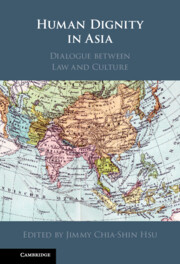Book contents
- Human Dignity in Asia
- Human Dignity in Asia
- Copyright page
- Dedication
- Contents
- Editor and Contributors
- Preface
- Abbreviations
- Introduction Human Dignity, Human Rights, and Cultural Change in Asia
- 1 Human Dignity in Indian Constitutional Adjudication
- 2 The Development of Individual Dignity in Japan
- 3 Constitutional Discourse on Human Dignity in South Korea
- 4 Human Dignity in the Jurisprudence of the Taiwan Constitutional Court
- 5 The Human Dignity Factor
- 6 Human Dignity in the Jurisprudence of the Indonesian Constitutional Court
- 7 Dignity as a Constitutional Value in Hong Kong
- 8 Human Dignity and Relational Constitutionalism in Singapore
- 9 Personal Dignity under Chinese
- 10 Virtue, Dignity, and Constitutional Democracy
- 11 Buddhist Philosophical Approaches to Human Dignity
- 12 Dignity and Status in Ancient and Medieval India
- 13 Human Dignity, Pancasila, and Islam
- 14 Catholicism and Human Dignity in the Philippines
- 15 Protestantism and Human Dignity in South Korea
- Index
1 - Human Dignity in Indian Constitutional Adjudication
Published online by Cambridge University Press: 26 July 2022
- Human Dignity in Asia
- Human Dignity in Asia
- Copyright page
- Dedication
- Contents
- Editor and Contributors
- Preface
- Abbreviations
- Introduction Human Dignity, Human Rights, and Cultural Change in Asia
- 1 Human Dignity in Indian Constitutional Adjudication
- 2 The Development of Individual Dignity in Japan
- 3 Constitutional Discourse on Human Dignity in South Korea
- 4 Human Dignity in the Jurisprudence of the Taiwan Constitutional Court
- 5 The Human Dignity Factor
- 6 Human Dignity in the Jurisprudence of the Indonesian Constitutional Court
- 7 Dignity as a Constitutional Value in Hong Kong
- 8 Human Dignity and Relational Constitutionalism in Singapore
- 9 Personal Dignity under Chinese
- 10 Virtue, Dignity, and Constitutional Democracy
- 11 Buddhist Philosophical Approaches to Human Dignity
- 12 Dignity and Status in Ancient and Medieval India
- 13 Human Dignity, Pancasila, and Islam
- 14 Catholicism and Human Dignity in the Philippines
- 15 Protestantism and Human Dignity in South Korea
- Index
Summary
In its Preamble, the Constitution of India lists dignity as one of several constitutional values. Dignity has no textual mention in the chapter on Fundamental Rights. The Supreme Court of India has, however, held dignity to be “the founding faith of the Constitution” and the “core of Fundamental Rights.” How is the special significance of dignity explained? By mapping the application of dignity by the Court, this chapter argues that judicial creativity with dignity has come at the cost of unanchored speculation about the content of dignity and uninhibited reliance on interdisciplinary academic literature. Dignity consequently figures in judicial decisions as a right, a justificatory value, and a reason for limiting individual rights. The content of dignity, however, remains perilously thin, and judicial enthusiasm has not resulted in clarity. Rather, questions arise about how extra-legal materials are employed in judicial decisions. The Indian experience, akin to several others, also raises concerns that arise when legal actors, primarily with legal expertise, employ moral and political values as justifications in constitutional rights adjudication.
- Type
- Chapter
- Information
- Human Dignity in AsiaDialogue between Law and Culture, pp. 21 - 39Publisher: Cambridge University PressPrint publication year: 2022

